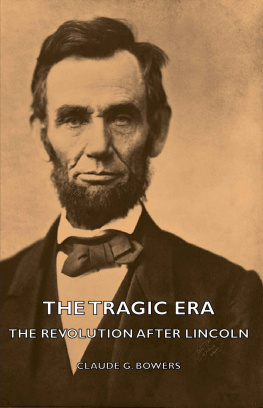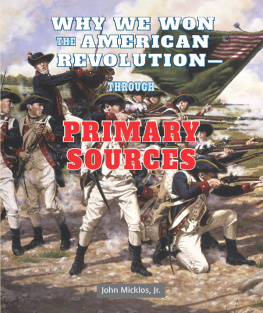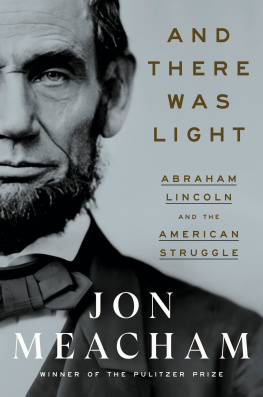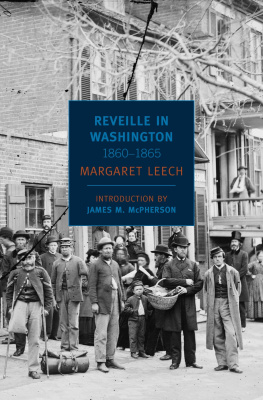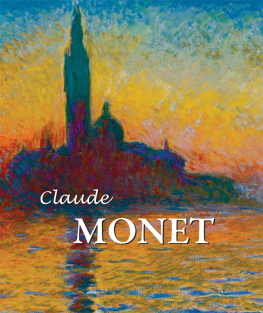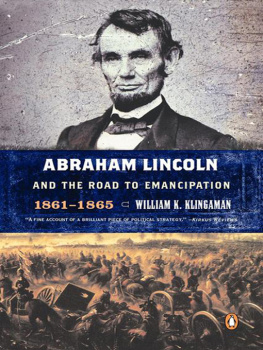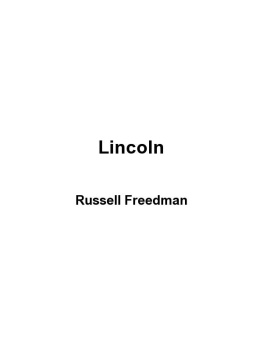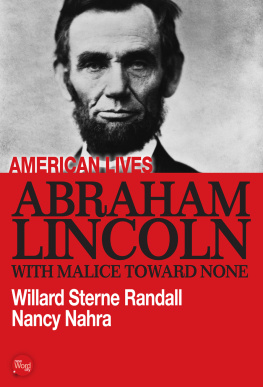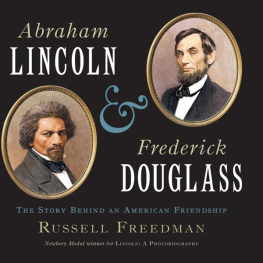Claude G. Bowers - The Tragic Era: The Revolution After Lincoln
Here you can read online Claude G. Bowers - The Tragic Era: The Revolution After Lincoln full text of the book (entire story) in english for free. Download pdf and epub, get meaning, cover and reviews about this ebook. year: 1929, publisher: Read Books Ltd, genre: History / Science. Description of the work, (preface) as well as reviews are available. Best literature library LitArk.com created for fans of good reading and offers a wide selection of genres:
Romance novel
Science fiction
Adventure
Detective
Science
History
Home and family
Prose
Art
Politics
Computer
Non-fiction
Religion
Business
Children
Humor
Choose a favorite category and find really read worthwhile books. Enjoy immersion in the world of imagination, feel the emotions of the characters or learn something new for yourself, make an fascinating discovery.
- Book:The Tragic Era: The Revolution After Lincoln
- Author:
- Publisher:Read Books Ltd
- Genre:
- Year:1929
- Rating:5 / 5
- Favourites:Add to favourites
- Your mark:
- 100
- 1
- 2
- 3
- 4
- 5
The Tragic Era: The Revolution After Lincoln: summary, description and annotation
We offer to read an annotation, description, summary or preface (depends on what the author of the book "The Tragic Era: The Revolution After Lincoln" wrote himself). If you haven't found the necessary information about the book — write in the comments, we will try to find it.
The Tragic Era: The Revolution After Lincoln — read online for free the complete book (whole text) full work
Below is the text of the book, divided by pages. System saving the place of the last page read, allows you to conveniently read the book "The Tragic Era: The Revolution After Lincoln" online for free, without having to search again every time where you left off. Put a bookmark, and you can go to the page where you finished reading at any time.
Font size:
Interval:
Bookmark:
The Revolution after Lincoln

ANDREW JOHNSON
IF Hilaire Belloc is right in his opinion that readable history is melodrama, the true story of the twelve tragic years that followed the death of Lincoln should be entertaining. They were years of revolutionary turmoil, with the elemental passions predominant, and with broken bones and bloody noses among the fighting factionalists. The prevailing note was one of tragedy, though, as we shall see, there was an abundance of comedy, and not a little of farce. Never have American public men in responsible positions, directing the destiny of the Nation, been so brutal, hypocritical, and corrupt. The Constitution was treated as a doormat on which politicians and army officers wiped their feet after wading in the muck. Never has the Supreme Court been treated with such ineffable contempt, and never has that tribunal so often cringed before the clamor of the mob.
So appalling is the picture of these revolutionary years that even historians have preferred to overlook many essential things. Thus, Andrew Johnson, who fought the bravest battle for constitutional liberty and for the preservation of our institutions ever waged by an Executive, until recently was left in the pillory to which unscrupulous gamblers for power consigned him, because the unvarnished truth that vindicates him makes so many statues in public squares and parks seem a bit grotesque. That Johnson was maligned by his enemies because he was seeking honestly to carry out the conciliatory and wise policy of Lincoln is now generally understood, but even now few realize how intensely Lincoln was hated by the Radicals at the time of his death.
A complete understanding of this period calls for a reappraisal of many public men. Some statesmen we have been taught to reverence will appear in these pages in sorry rles. Others, who played conspicuous parts, but have been denied the historical recognition due them, are introduced and shown in action. Thus the able leaders of the minority in Congress are given fuller treatment than has been fashionable, since they represented more Americans, North and South, than the leaders of the Radical majority, and were nearer right on the issues of reconstruction. Thus, too, the brilliant and colorful leaders and spokesmen of the South are given their proper place in the dramatic struggle for the preservation of Southern civilization and the redemption of their people. I have sought to re-create the black and bloody drama of these years, to show the leaders of the fighting factions at close range, to picture the moving masses, both whites and blacks, in North and South, surging crazily under the influence of the poisonous propaganda on which they were fed.
That the Southern people literally were put to the torture is vaguely understood, but even historians have shrunk from the unhappy task of showing us the torture chambers. It is impossible to grasp the real significance of the revolutionary proceedings of the rugged conspirators working out the policies of Thaddeus Stevens without making many journeys among the Southern people, and seeing with our own eyes the indignities to which they were subjected. Through many unpublished contemporary family letters and diaries, I have tried to show the psychological effect upon them of the despotic policies of which they were the victims. Brutal men, inspired by personal ambition or party motives, assumed the pose of philanthropists and patriots, and thus deceived and misguided vast numbers of well-meaning people in the North.
In the effort to re-create the atmosphere and temper of the times, I have made free use of the newspapers of those times. Invaluable for this purpose has been my access to the unpublished diary of George W. Julian, which covers the entire period. Through him we are able to sit in at important conferences that hitherto have been closed to the historians.
Much attention has been given to the amusements and the social background because of the unprecedented prominence of women throughout these struggles. Gay ribbons and furbelows and flirting fans were not far distant from the fighting. The women ranged in culture and character from the incomparable Kate Chase Sprague to the dusky sisters of the mixed salon in Columbia, South Carolina. Never had women lobbyists used their sex in securing legislative favors for selfish groups so brazenly or so cleverly. The tragedy of Mrs. Belknap is as significant of the spirit of the times as the impeachment proceedings against Johnson.
The story of this Revolution is one of desperate enterprises, by daring and unscrupulous men, some of whom had genius of a high order. In these no Americans can take pride. The evil that they did lives after them. They changed the course of history, and whether for ultimate good or bad is still on the lap of the gods. The story carries lessons that are well worth pondering.
CLAUDE G. BOWERS
Lincoln dies At the Kirkwood House Johnson in the streets Takes the oath Consternation in the South Radicals see obstacle removed Their attitude toward Lincoln Hopeful of Johnson Doubtful of Grant Sumners call on Johnson A party caucus His death a godsend to our cause Conference to oust Lincolns Cabinet Ben Butler for Secretary of State A Sunday conference with Johnson Ben Butler arrives Must not administer on the estate of Lincoln Sunday night with Stanton Butlers Radical war-cry Johnson to visiting delegations Lincolns funeral Johnsons routine New faces Working on Johnson Sumner prefers him to Lincoln Doubt on negro suffrage The Democrats and Johnson Master of the Back Stairs Demand for negro suffrage Phillipss Theodore Tiltons The North Carolina Proclamation Radicals turn on Johnson Sumner shocked Schurz goes South Low estate of the Presidency A bad summer for former Presidents The Cooper Union meeting Logan supports Johnson Anti-negro feeling in North Race riots General Sherman against suffrage Radicals organize Union League Club sends negro organizers South Boston mass meeting Julian tours Indiana against Johnson Morton replies Julian answers Hang liberally Thad Stevens at Lancaster His speech Confiscate Johnsons busy days His receptions His health Negro suffrage gains The President of Vassar Johnsons plain talk to negro committee Phillipss obscene comment.
Henry Adamss impressions Charles Dickenss Charles Francis Adamss Johnsons dress His form and features His father An old bit of gossip A bitter boyhood His pride Goes to Tennessee Educates himself His class consciousness Social distinctions at Greeneville His shop a Jacobin club Enters politics for democracy A Jeffersonian A Jacksonian Labors candidate In Congress Constructive ability His Homestead fight Battles for the Union Military Governor Nominated for Vice-President as a Democrat His constitutional amendments A social revolutionist His views on slavery On Browns raid I shall not worship at his shrine His views of war purposes Like Lincoln His religion Fight against Know-Nothings His drinking His intoxication at inauguration A moderate drinker His oratory His courage His honesty His craftiness Nursed no resentments His tireless energy His intellectual power Tactlessness Tenderness to family Susceptible to womans beauty Personal purity His two great passions.
Chase starts South Desolate highways Homes in ashes Ruin in Charleston In Columbia The call to charity No money Plantation destitution The labor problem Former slaves and masters Turning negroes against old masters The work of Northern demagogues Freedmen refuse work Forty acres and a mule Following the army Flock to towns Religious frenzy Gods chosen children Wese de winnin culler Demanding the vote Army of occupation Playing on credulity of negroes Debauching colored girls Idle soldiers Officers in best homes Conflicts of civil and military authority Effect of negro soldiers Acts of brutality The spirit of Southern women A social tragedy at Chapel Hill Reports on the spirit of the South Chases electioneering tour Urges vote for negroes Receives negro delegations His Charleston meeting A picturesque scene Raises false hopes Northern reactions to Charleston speech Incendiary talk Chase to Sea-Islanders Roll, Jordan, roll In Savannah Desolation Chase talks politics to blacks Hears white protests on mixed schools Scenes at Jacksonville Talks suffrage Reviews negro parade in Mobile At New Orleans Confers with politicians Attends negro party in former home of the Soules A burlesque scene Negro women have charms Chase resents North Carolina Proclamation Southern civilization in peril Southern legislation on negroes Radical reaction North Convert Mississippi into a frog pond Professor Dunnings opinion of the Black Codes Thad Stevens meditates action.
Font size:
Interval:
Bookmark:
Similar books «The Tragic Era: The Revolution After Lincoln»
Look at similar books to The Tragic Era: The Revolution After Lincoln. We have selected literature similar in name and meaning in the hope of providing readers with more options to find new, interesting, not yet read works.
Discussion, reviews of the book The Tragic Era: The Revolution After Lincoln and just readers' own opinions. Leave your comments, write what you think about the work, its meaning or the main characters. Specify what exactly you liked and what you didn't like, and why you think so.

